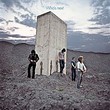|
|

Speakers' corner: The Who Following up our retro scope series of 2006 and 2007, 2009 and 2010 - here's the ever-continuing, never-stopping New Speakers' corner! Luna Kafé's focused eye on great events, fantastic happenings, absolute milestones, or other curious incidents from the historic shelves/vaults of rock. This moonth's piece takes us 40 years back, yet once more back to the summer of 1971. To revisit the 5th by the wild bunch; the swinging mike singer, windmill-Pete guitarist, the mad Moon drummer and the quiet bass player. After some years of smashing amps, guitars and drums, they'd entered the 1970s as one of the big UK 60s bands surviving the 1960s. Yes, they were wild, but they survived their lifestyle. Even though their equipment didn't.
The Who Generally I think mainstream rock is boring. In the outskirts of rock, however, there exist lots and lots to enjoy and explore. The Who might be considered one of the greatest straight rock bands. Still, the band has been a personal favourite for quite some decades. Maybe it's because I discovered them in my puberty when really important matters like music was close to the meaning of life. But also because main song composer Pete Townshend is a multifaceted personality. He can be the tough arrogant nihilistic punk, but also a soft vulnerable guy, a spiritual seeker and lots more. He is one of the few who could relate to both the hippie and punk values without losing credibility. Like it's studio predecessor Tommy (1969), Who's Next started its life as a rock opera, called Lifehouse, but of a quite different multimedia calibre, incorporating filmed live appearances, participation by Who related persons and lots more. Read all about Lifehouse elsewhere on the big bad net. It almost drove Pete Townshend to the edge of a nervous breakdown and suicide. Eventually the band decided to do the same as Beach Boys had done with Smile a few years earlier: abandon the original project, but record some of the great songs along with others as part of an album of individual songs. It turned out to be a good idea, at least as good as Beach Boys' Smiley Smile album. And Who's Next is filled with more than just nine rock'n'roll songs. Pete T. had started to experiment with analogue synthesizers to great effect on the album. Here are more synth, organ and piano than on any previous Who album. Still, it's mainly guitar dominated, as usual. Usual, too, was also the distinct and precise bass playing by John Entwistle (RIP!) and strong voice of lead vocalist Roger Daltrey. Keith Moon's (RIP!) drumming was even more distinct, but less precise. Keith never sounded like anyone else with all his beats, sounding like a giant crush occasionally, and no one has managed to sound (or act) like him. (Well, The Animal of The Muppet Show might be an exception.) But it works and was a vital part of the Who sound. Usually it's boring to scrutinise each song of an album in the same succession as on the album. It seems more just to do so here than ever, due to the strength of the songs and the climaxes of the album. Among other ideas, the Lifehouse project involved feeding information about persons, Who fans and others, into a synth and turn it into music. For a long time it was believed that the intro of "Baba O'Riley" was the synth result of info about Pete Townshend's Indian spiritual guider Meher Baba. In fact it is Pete fiddling along on a Lowrey organ (the cheaper version of a Hammond). But soon the usual instruments crashes in, plus a ceremonious piano while the organ keeps spinning in the background, almost like a drone. 'It's only teenage wasteland...' Ah! Towards the end the violin of Dave Arbus gives the song a classical touch before he almost turns it into folk-rock; the closest Who has been to folk-rock anyway. "Bargain" is one of the heavier Who songs with a couple of softened simple synth solos in between. Cool! "Love Ain't For Keeping" includes some wonderful acoustic guitar from Pete within the disillusionment. The greatest ballad here. Bass maestro John Entwistle usually wrote a song or two for each Who album. "My Wife" is one of his best and most solid rockers. Up there with his classic 1966-number "Boris The Spider". The inclusion of a precise brass section lifts it even higher. "The Song Is Over" starts as another sad ballad, with some fascinating curling synth in between the piano played by Nicky Hopkins. It's not only the song that is over, it's love, too. But after about 80 seconds Roger takes over the lead vocals from Pete and the song isn't over after all and instead it works as a liberating force: 'I'll sing my song to the wide open spaces, I'll sing my heart out to the infinite sea, I'll sing my visions to the sky and mountains, I'll sing my song to the free, To the free'. Pete takes over and brings it down again, and so it alternates until Roger finishes it all with a short excerpt from another Townshend song "Pure And Easy", not released in its entirety until the writer's first solo album Who Came First a year later. Side two of the original LP starts with "Getting In Tune", another one dominated by Hopkins' piano, but as much by Townshends hard edged guitar. The straightest Who song here, perhaps. "Going Mobile" on the other hand is the furthest off the beaten track and the least serious of the lot, even with some English music hall reverberations in there. Pete praises the assets of living in a caravanette, a home on wheels (I'm an air-conditioned gypsy...'). And with some beep-beeps included! (The band took it some steps further on Who By Numbers four years later with "Squeeze Box", Homer Simpson's favourite Who song. But that's another story...) "Behind Blue Eyes" is probably the most famous song from the album in recent years, not least because of the Limp Bizkit cover version from 2003 where bits of the lyrics are different. It's the song sung by Jumbo, the bad guy of the Lifehouse project. In recent days I've thought it could also be the song of the bad guy of Norway (greatest enemy of state and population), except the second last verse and the fact that he doesn't seem to be sad about his misdeeds: No-one knows what it's like No-one knows what it's like But my dreams they aren't as empty No-one knows what it's like No-one bites back as hard But my dreams they aren't as empty When my fist clenches, crack it open And f I swallow anything evil No-one knows what it's like The indisputable highlight of Who's Next comes at the end. "Won't Get Fooled Again" is Townshends eight and a half minutes confrontation with the 1968 generation: 'We'll be fighting in the streets I'll tip my hat to the new constitution The change, it had to come The song opens with the classic synthesizer riff of rock history augmented by a touch of flanger(?) effect. It keeps spinning throughout the song as the organ of "Baba O'Riley", but it's Townshend's guitar, oozing of authority, that really drives the song forward. Occasionally I think The Who might have been an even greater band without Roger Daltrey. I normally prefer Pete's voice to Roger's, probably due to more personality. On this album Pete sings more than his usual share. It seems he sings the most personal parts of his own lyrics here. "Won't Get Fooled Again" is Roger's triumphant tour de force. Pete's voice isn't strong enough to sing it the way Roger manages. And that final powerful scream towards the end after the synth solo (so to speak) and before the classic end of the lyrics 'Meet the new boss, Same as the old boss' couldn't be matched by anyone. Superb! To conclude: Who's Next stands as solid as the concrete block on the cover. One of the most classic albums in the history of rock'n'roll! Nine songs of maximum r'n'b! Copyright © 2011 JP
|
| You may also want to check out our Who articles/reviews: Endless Wire, I Can't Explain, My Generation, Quadrophenia - Different Deluxe versions. |
| © 2011 Luna Kafé |
